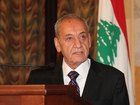Speaker Nabih Berri hinted that the ongoing contacts to form a new cabinet have so far failed to reach common ground, criticizing those who began classifying themselves as centrists while they are “clearly affiliated in the March 14 alliance.”
“Those centrists want a large share of the 24-member cabinet... Maybe I should start classifying myself as a centrist,” Berri told several local newspapers on Wednesday.
 Full Story
Full Story
Maronite Patriarch Beshara al-Rahi, who is currently abroad, dispatched on Tuesday Beirut Bishop Boulos Matar to President Michel Suleiman, al-Mustaqbal bloc leader Fouad Saniora and caretaker Minister Wael Abou Faour as part of efforts to resolve the elections crisis.
“We discussed the elections and the electoral law that we are looking forward to in Lebanon,” the bishop said after meeting Saniora.
 Full Story
Full Story
Al-Mustaqbal lawmakers rejected on Tuesday to provide legitimacy to a parliamentary session set for May 15 if the rival parties failed to reach consensus on a new electoral law.
In remarks to the Kuwaiti al-Anbaa daily, MP Ahmed Fatfat said al-Mustaqbal “will not give legitimacy to the session” set by Speaker Nabih Berri if the so-called Orthodox Gathering proposal was put on its agenda.
 Full Story
Full Story
Caretaker Social Affairs Minister Wael Abu Faour on Monday announced that a progress has been made in the cabinet formation process, revealing that an preliminary agreement has been reached on the “general formula” of the new government.
“As usual, the meeting with Speaker Berri was part of the continuous consultations and coordination between Speaker Berri and National Struggle Front head Walid Jumblat over two issues: the electoral law and the cabinet,” Abu Faour said after talks in Ain al-Tineh.
 Full Story
Full Story
Speaker Nabih Berri has vowed to force lawmakers to hold intense talks at the parliament for several days this month until they reach agreement on a new electoral law.
“You will see what I will do on May 15. I will let MPs sleep at the parliament for three or four days until they come up with a law,” pan-Arab daily al-Hayat quoted him as saying.
 Full Story
Full Story
Maronite Patriarch Beshara al-Rahi's envoy Beirut bishop Boulos Matar stressed the need for political powers to reach an agreement over a new parliamentary electoral law and staging the polls, various media reports said Saturday.
According to al-Joumhouria, Matar quoted al-Rahi as saying: “Lebanon will lose the respect of several countries if its failed to agree on a vote law and stage the elections.”
 Full Story
Full Story
Progressive Socialist Party leader MP Walid Jumblat stated that the political powers “without exception” can reach an agreement over the hybrid parliamentary electoral law, while voicing his disappointment with Hizbullah chief Sayyed Hassan Nasrallah's latest speech, reported As Safir newspaper Friday.
He told the daily: “The hybrid law can help ease the political and religious monopolization of power.”
 Full Story
Full Story
Christian leaders are expected to hold talks in Bkirki under the auspices of Maronite Patriarch Beshara al-Rahi to coordinate their stance over the electoral law dispute.
According to An Nahar newspaper published on Friday, the meeting will be held ahead of a parliamentary session set on May 15 to vote on the Orthodox Gathering proposal that was approved by the joint parliamentary committees.
 Full Story
Full Story
Al-Mustaqbal bloc MP Ahmed Fatfat revealed on Thursday that he asked Speaker Nabih Berri to reconsider former Prime Minister Saad Hariri's electoral initiative that calls for electing a senate along with holding the parliamentary elections, and later introducing the reforms mentioned in the Taef Accord.
"We have asked Berri to revisit Hariri's suggestion and he showed high responsiveness to our request,” Fatfat said after meeting with the speaker in Ain al-Tineh.
 Full Story
Full Story
Speaker Nabih Berri continued on Tuesday his consultations with various political powers to reach an agreement over a new parliamentary electoral law, reported As Safir newspaper Wednesday.
It said that he held a meeting with Mustaqbal MP Ahmed Fatfat and Phalange MP Sami Gemayel to that end and during which he proposed a law based on 13 districts and the winner-takes-all and proportional representation systems.
 Full Story
Full Story



